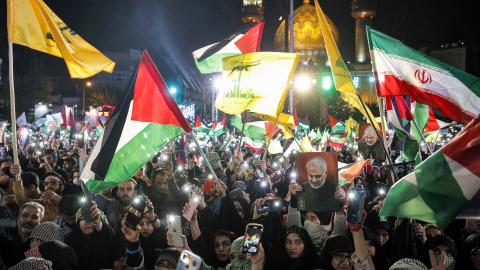The Oct. 7 massacre in southern Israel was a climax in Iran’s proxy war against Israel and the West, as Tehran attempts to reshape the Middle Eastern order in its favor. By conducting the worst terrorist attack inside Israel using Hamas, the Iranian regime achieved numerous strategic and tactical objectives.
On that ominous Saturday, Iran dealt a great security blow to the Jewish state. Israel’s intelligence and security services have been called into question for failing to anticipate the large-scale attack as hundreds of Hamas terrorists penetrated Israel and massacred some 1400 people.
By plotting this slaughter, Iran also further managed to sideline the pro-peace, pro-two-state Palestinian factions, while propping up Hamas, Islamic Jihad, and other terrorist organizations that are determined to annihilate the state of Israel.
The ramifications of the Oct. 7 massacre went far beyond Israel’s borders, though. Tehran’s bloody adventure in Israel derailed the Saudi-Israeli normalization process and weakened efforts to expand the historic Arab-Israeli peace initiative, better known as the Abraham Accords. Amid the Israel-Hamas war, Saudi Arabia has decided to put normalization with Israel “on ice” and it is not clear if or when the normalization can be salvaged.
Israel’s ties with Turkey too, have become a casualty of the Israel-Hamas war. Tehran has irreversibly harmed slowly mending Turkish-Israeli ties by fabricating a conflict that has brought about a dire humanitarian situation in Gaza, provoking Muslim and Turkish outrage.
In addition, by destabilizing the region, Iran has at least temporarily succeeded in neutralizing the proposed India-Middle East-Europe Economic Corridor. This was supposed to be the biggest international economic development plan after China’s Belt and Road Initiative. Put forth by India, the corridor would have bypassed Iran and connected India through Israel and Arab Gulf states to Europe, as an alternative to China’s project.
Furthermore, as a counterweight to U.S. deployment in the Gulf, Iran has created a conducive ground for the presence of up to six Chinese warships in the Middle East region.
By creating an unprovoked crisis in the Middle East, Iran has also provided Russia with much-needed relief as the U.S. and the EU have distracted from the war in Ukraine. Undoubtedly, China and Russia are appreciative of the chaos in Gaza, masterminded by Iran against the rules-based world order. China and Russia have not condemned Hamas’s atrocities and only criticized Israeli strikes in Gaza. Sensing weakness from the United States, China may consider a more aggressive approach toward what it calls “Chinese Reunification” by taking Taiwan.
Finally, by manufacturing a conflict in Gaza, Iran has diverted global attention away from its nuclear program. A prolonged war in the Middle East, coupled with the Biden Administration’s weakness, can help Iran go nuclear.
Israel, meanwhile, is understandably angry and seeks revenge. However, instead of a protracted ground offensive in Gaza, Israel should direct its wrath against the Iranian regime that is the main culprit behind the Oct. 7 massacre. Hamas and other militia groups in Israel’s vicinity are Iran’s subcontractors who carry out their death missions on behalf of Ayatollahs in Tehran.
In addition, due to the asymmetrical nature of the conflict between Israel and Hamas, it is an unwinnable war for Israel without mass killing of Palestinian civilians. As the war drags on and the Palestinian death tolls rise, Israel loses much of the support it gained after Hamas’ attack. Any mass Palestinian casualties stemming from a prolonged Israeli ground invasion or reoccupation of Gaza would only serve Iran’s interests and that of Hamas and other radical non-state players in the Muslim world.
To avoid such future terrorist attacks, Israel must win this war, but not in Gaza. As extreme as it might sound, striking targets in Iran is the way to push Iran back and defeat its expansionist agenda.
Israel has already threatened to cut off “the head of the snake.” Now that Iran has initiated a proxy war against Jerusalem, Israel should seize the opportunity to destroy the clerical regime’s advancing nuclear program, among other things.
Hamas has nothing to lose, but Iran has everything to lose. Iran’s nuclear facilities, missile, and drone programs, and the Islamic Revolutionary Guard Corps headquarters are legitimate targets. Israel needs full U.S. military, intelligence, and technological support to carry out its strikes once and for all. Only effective strikes on those targets would reverse Iran’s decisive victory on Oct. 7, not to mention its alarming nuclear advancements.
Iran has already won the 2023 Israeli-Gaza war and achieved major victories through its proxies in Gaza, namely Hamas and Islamic Jihad. Yet the clerical regime denies having any role in the conflict and sees the West as gullible. Some Biden administration officials repeat the same falsehood and naïvely, or even worse, dishonestly claim that there is no evidence Iran was involved in the recent terrorist attack in Israel.
Under the guise of plausible deniability, Tehran has recently stepped up its proxy attacks against U.S. targets. The lack of a credible deterrence under the Biden administration is to blame for more than 40 proxy attacks on U.S. forces by Iran-led proxy groups in the Middle East. Iran knows how to hide behind its terrorist proxy forces to evade consequences. Yet, by removing Qasem Soleimani, the commander of Iran’s Quds Force, former President Donald Trump proved that Iran can and must be held responsible for the actions of its surrogates.
The West must establish plausible deterrence while rejecting Iran’s game of plausible deniability concerning its terrorist activities in the Middle East region and beyond.
The longer the U.S. and Israel avoid establishing military deterrence by directly holding the Iranian regime to account for Hamas and other proxy attacks, the more Washington and Jerusalem are going to be vulnerable to attacks by Iran’s proxies.















